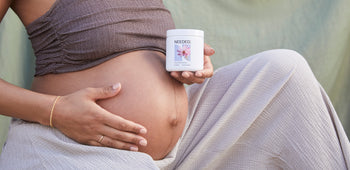Pregnancy comes with a lot of excitement, and a lot of weird symptoms. For some women, one of those weird symptoms is a change in urine color.
Is it normal? Why does it happen? Can you do anything about it? Read on for the full scoop.
Is There Any Change in Urine Color During Pregnancy?
Many women notice a change in their urine color during pregnancy. For some, it may appear darker than normal, and for others it may appear lighter or almost clear. Urine color can also change throughout pregnancy.
What Can Cause Changes in Urine Color During Pregnancy?
There are several different factors that can influence pee color while pregnant.
Dehydration
The most common cause for a change in pee color while pregnant is dehydration.
This is because urine gets its yellow color from a substance called urobilin. Urobilin is a byproduct of bilirubin, a waste product from broken down red blood cells. The more fluid you consume, the more diluted the urobilin becomes.
Therefore, when you are well-hydrated, your urine will be a pale yellow color. When you are dehydrated, your urine will be a darker yellow color.
Typically, you can fix dehydration by drinking more fluids and adding in electrolytes. However, this can be hard for pregnant women who are dealing with morning sickness. Nausea and vomiting can make it hard to drink (and keep down) enough fluids. If you can’t keep water down, it is important to reach out to your healthcare practitioner so they can explore ways to help you avoid severe dehydration.
Increased Blood Flow
During pregnancy, there is an increased blood flow to the kidneys. This increase in blood flow can result in the kidneys producing more urine than you do when not pregnant. When you produce more urine, it can dilute urobilin and make the color of your urine appear lighter than normal.
Diet Changes
What you eat can affect the color of your pee, and many women find themselves eating a bit differently at least part of pregnancy thanks to cravings and aversions. Some common foods that can change the color of your urine are beets, blackberries, carrots, and fava beans.
Prenatal Vitamins
If you are new to taking a comprehensive prenatal vitamin, you may notice brighter urine. This is primarily due to B vitamins, especially Riboflavin (Vitamin B2). This doesn’t mean that you aren’t absorbing the nutrients in your vitamin, it just means that you are excreting the excess.
How Urine Changes Throughout Pregnancy
In addition to color changes, many pregnant women notice changes in their urine frequency throughout their pregnancy.
This can happen early in pregnancy due to the production of hCG, which rises through the First Trimester and then falls. Later in pregnancy, as the fetus grows, the uterus begins to press on the bladder. The bladder has less space and fills up more quickly, creating the urge to pee more frequently.
Urine Testing During Pregnancy
There are a few times during pregnancy that you might be asked to provide a urine sample:
- hCG - in certain cases, your healthcare provider may want to check hCG levels in early pregnancy to determine if levels are rising as expected
- Protein - urine may be tested for protein to identify bladder or kidney infections; later in pregnancy, it may indicate preeclampsia if combined with high blood sugar
- Sugar - some sugar in urine is normal, but high levels of sugars can be a sign of gestational diabetes; further testing may be done if sugars are elevated
What to do About a Dark Urine Color During Pregnancy
Hydrate! As hard as it may be, make sure you're drinking about half of your body weight in ounces each day. If you aren’t up for plain water, try other healthy hydrating options like sparkling water, coconut water, bone broth, and pregnancy-friendly herbal tea.
Electrolytes are also important for staying hydrated. Electrolytes maintain fluid balance, keep your heart beating normally (which aids in blood flow and regulates blood pressure), supports bone health, influences your hormones, and supports adrenal health.
All of the bodily functions that are influenced by electrolytes are magnified during pregnancy. Your body has more fluid (including amniotic fluid and cervical fluid), more blood, and more hormones. Electrolytes support these increased demands and also help to alleviate common pregnancy symptoms that can arise from these demands, like headaches, muscle cramps, fatigue, and swelling of your extremities. They can also encourage you to drink more water, which will result in a lighter pee color while pregnant.
When to See Your Doctor
Like many other seemingly strange symptoms, changes in urine color during pregnancy are normal. Your urine may be lighter, brighter, or darker at times. However, if your urine is consistently dark for several days, or if it is red or contains blood, brown, orange, or cloudy, reach out to your healthcare provider immediately.














